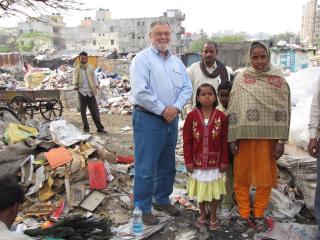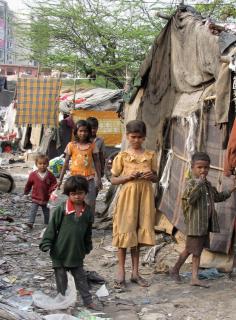Waste pickers of New Delhi
On February 14, 2011, Rev. Peter Morales, President of the Unitarian Universalist Association (UUA), embarked upon a two-week journey to India to visit with several partners of the Unitarian Universalist Holdeen India Program (UUHIP) and with leaders of the Unitarian Union of North East India (UUNEI). This blog post by Rev. Morales is part of the continuing coverage of the journey. In this update Rev. Morales reflects upon his visit with waste pickers in New Delhi.
The best way to read this posting is to sit next to an open garbage can, preferably a “ripe” can. Try to imagine living with that smell all day, every day.
Today we visit “waste pickers” in New Delhi. These people make their living sorting through garbage, picking out what has value in the recycling market. It rained a couple of days ago, so the path into the site is muddy. We have to pick our way carefully. Mahesh and Shashi, who work to help organize waste pickers, lead us to a small room. The room is the only “structure” in the dump. This dump for sorting garbage is one of about 70 in the city.
We enter to meet some of the leaders of this waste picker community. As always, they offer tea. We hear numbers that are simply staggering. There are 350,000 waste pickers in Delhi. This site is far from the worst. In the distance we can see a “land fill” larger than the mesas back home in Colorado. The waste pickers live here at the site, in makeshift huts among the garbage. Cattle and dogs wander around.
The big issues for these waste pickers right now are, ironically enough, access to garbage and a place to process it. Now that there is money in recycling, big corporations are moving in, threatening to move these people from garbage sorters to unemployed. They also want a place set aside for sorting so that they don’t have to live among the piles of waste.
I find myself wondering whether any of these people have ever slept in a bed with a mattress and sheets. Or whether any of them have ever experienced hot and cold running water. I wonder, but I know the answer. Few of these people will live to the age of 50.
In a matter of weeks or months everyone will be forced to leave. As New Delhi continues its explosive growth (there are something like 17 million in the metropolitan area), the waste sorting sites get pushed further and further out. A couple of blocks away a new five star hotel is going up. Its owners will not want guests looking out on heaps of garbage.
The children here cannot attend government school because they are “undocumented.” Having been born at home in villages, they cannot prove they are citizens of India. India has millions of illegal migrants who are actually Indian citizens but cannot prove it.
The small room we are in doubles as a one-room school run by volunteers. On the chalkboard are names of the months in Hindi and English. The school started with five children. Now there are 55, so many that they have to meet outdoors. As we meet, a couple of curious kids pop in. One boy, dressed in yellow pants and shirt, looks like he just got out of the shower. His hair is perfectly combed.
As we visit, it is clear that the people, while quite friendly and polite, are not sure what to make of a religious leader who has come wearing jeans and sturdy REI walking shoes. They wonder if I am going to preach or do something ceremonial. I try to explain that for us, spirituality and work for human equality are inseparable, that for many UU’s service is our prayer. “Oh,” one of them says in Hindi, “for you work is worship.”
The program we fund through the UU Holdeen India Program helps support basic organizing work among the waste pickers. Progress is very slow. The challenge is simply staggering.
As I return to my simple hotel room (one star level, but it now seems like the ultimate in luxury), I reflect on what I have seen. None of this is necessary. People need not live like this.
I realize that what is most disturbing in all of this is what has happened to people in India and in the whole of our world when we tolerate such things. Some important part of us dies when we become numb to the suffering of others.
Rev. Morales was recently on a two-week journey across India to meet with human rights partners.




